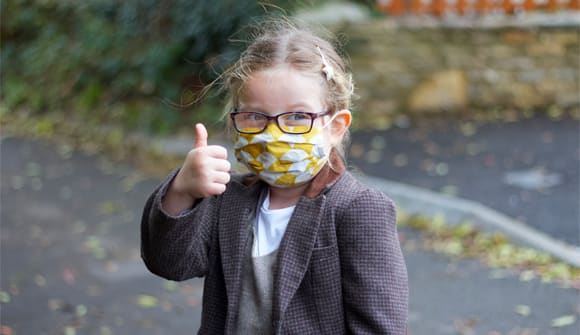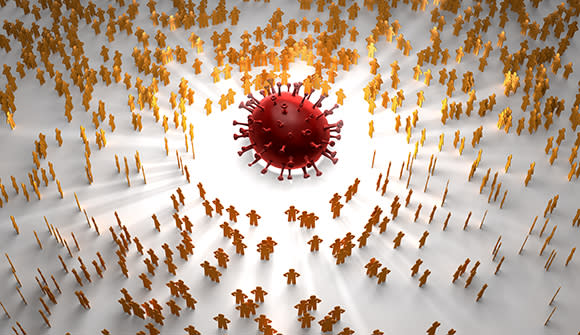Preventing MIS-C
Study finds COVID-19 vaccine also prevents kid-specific syndrome.
Article Author: Katie McPherson
Article Date:

In the past two years, parents have probably become all too familiar with the term MIS-C, a condition that can arise in children after they’ve had COVID-19. Multisystem inflammatory syndrome in children (MIS-C) causes symptoms like abdominal pain, GI issues, rash, low blood pressure, heart failure and more, according to the U.S. Centers for Disease Control and Prevention (CDC).
While the illness is rare, affecting 1 in 3,000 to 4,000 children who have had COVID-19, physicians agree you don’t want your child to be that one. Most children who have it need to be hospitalized — often requiring intensive care — and the long-term effects are largely unknown.
The good news: it appears MIS-C can be prevented. A new study from the CDC found two doses of the Pfizer-BioNTech vaccine were 91% effective at preventing MIS-C in children ages 12 to 18. Research hasn’t yet been done on younger children, but experts said the protection likely extends to all vaccinated kiddos.
Here’s what two pediatric experts want parents to know about MIS-C, this new study, and vaccinating their children.
Kids can get MIS-C even after a mild case of COVID-19.
MIS-C typically occurs two to six weeks after a mild — or even asymptomatic — COVID-19 infection. Ana Alvarez, MD, board-certified pediatric infectious disease specialist at Wolfson Children’s Hospital, said even if your child gets through the virus like they would a typical cold or sinus infection, that doesn’t mean he or she is in the clear.
“In initial reports, most patients who developed MIS-C did not have history of severe illness or even a known positive case of COVID-19,” she said.
MIS-C can be incredibly serious.
Some parents may think they don’t need to vaccinate their children since COVID-19 tends to be less severe in kids than adults. While that’s typically true, the potential for MIS-C to develop after an infection should make those parents think twice.
“People can say, ‘Eh, it's a fairly benign virus for kids.’ But in reality, it's probably not,” said Thomas Nakagawa, MD, board-certified pediatric critical care specialist and medical director of the Pediatric Intensive Care Unit (PICU) at Wolfson Children’s Hospital. “We’re learning more about the long-term effects of COVID-19 in kids. MIS-C is real, and children do die from it. We've had some deaths here in our PICU. That should be cause for alarm and concern every parent.”
Dr. Alvarez added that almost all children with MIS-C end up in the hospital.
“Kids with MIS-C typically come into the ER and may need to go straight to the PICU,” said Dr. Alvarez. “Some require medication to maintain their blood pressure. Many require a breathing tube and medical ventilation. We have had kids who were on ECMO, a specialized heart and lung support device. A significant number of them have pneumonia or respiratory distress. Some require dialysis because they have kidney failure as part of MIS-C. It can also attack the brain, and that’s very scary; People don’t realize MIS-C can cause severe encephalitis, or inflammation of the brain tissue.”
COVID-19 infection prevention is key.
Scientists are still trying to understand how MIS-C develops. Currently, they believe it’s caused by the immune system having an overreaction to COVID-19, so it makes sense why getting vaccinated would prevent both illnesses.
“In response to COVID-19, the body produces antibodies against the virus. Sometimes the immune system goes into overdrive and produces antibodies against small parts of the virus, which can be similar to normal cells in the human body. These so-called autoantibodies can lead the immune system to attack the body’s cells,” said Dr. Alvarez. “Interestingly, in a small study, researchers did not find these new autoantibodies in individuals who received the COVID-19 vaccine. This offers another possible explanation of how the vaccine protects children against MIS-C."
You can protect your child from COVID-19 and MIS-C.
Children ages 5 and up are eligible to receive a COVID-19 vaccine, and both of these pediatric experts agree it’s the best protection parents can give them against the virus and MIS-C.
“In real-world studies, the vaccine has shown to be 93% effective at preventing COVID-19 hospitalizations in the 12- to 18-year-old age group, and now, with this study, it appears to be almost as effective against MIS-C in the same age group,” Dr. Alvarez said.
“The vaccine is like a car seat or seat belt. It may not eliminate all injuries, but it enhances the chances of survival,” said Dr. Nakagawa. "People always think something bad won’t happen to them or their children, but if they are that one who gets MIS-C, you have to deal with the consequences. Those can be devastating. The one thing we know lessens disease all the way across the board for COVID-19, including MIS-C, is getting vaccinated.”
Have questions about the COVID-19 vaccine and children? At Wolfson Children’s Hospital, we want to help keep our community informed. For answers to frequently asked questions, including vaccination locations, visit wolfsonchildrens.com/covid19. For more information about COVID-19 vaccines for adults and children, visit baptistjax.com/covid19vaccine.



